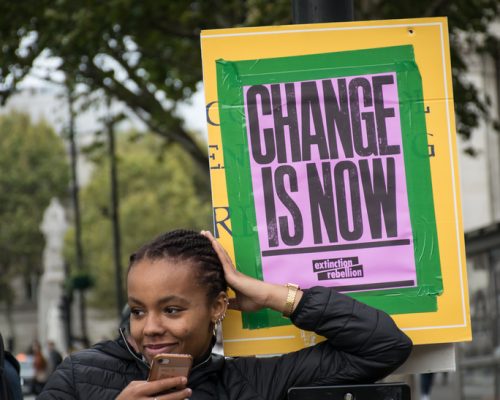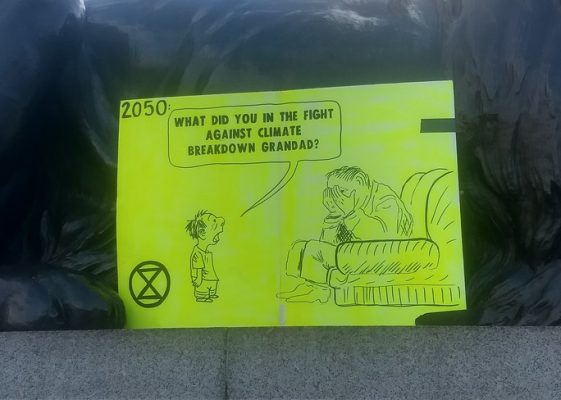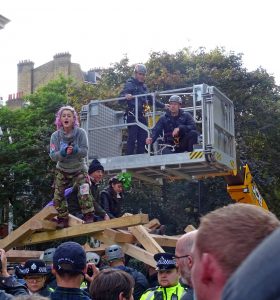About Me
I’m John, 42 years old and a Mechanical Engineer.

How I got involved
I’ve spent my life concerned about the environment, but I accepted the rules and have attempted to work within the system to make incremental change. I’ve voted for parties with progressive and environmental agendas, I’ve signed petitions, written to my MP and attended meetings. Of course, I also recycle, turn off lights, etc.
Through my career I’ve mainly worked on two of the great environmental villains: diesel engines and jet engines. My motivation was always to use my abilities to improve efficiency and emissions, and many of my colleagues felt the same. Industry has genuinely invested billions in cleaning up these engines, and I am proud of being a part of this effort. However, incremental changes are not getting us where we need to be. If we had an extra 50 years to deal with the crisis, I would probably not rock the boat, but science clearly shows us that the current rate of progress is pathetically insufficient. To remain compliant is a form of denial.
As the penny has dropped for me in the last few years, I’ve given up buying meat & flying and have become more politically active including standing for election. However, I’m also convinced of the merit of the theory of society change that lies behind XR’s actions. Non-violent disruption is a proportionate and effective response to the crisis we face, and it has a history of being effective. We have many of the technical solutions; we just need to make the decision to pursue them. Once government policy recognises that renewables are the future and creates a level playing field on which they can compete, I will be delighted to revert to my previous life as a law-abiding mechanical engineer and use my skills to help the effort to transform society. Even so, we will still all need to moderate our consumption; there is no technical fix that will free us of the need to change our lifestyles.
Before Rebellion
The vibrant rebellion sites don’t happen by magic; a lot of work goes in to make artwork and costumes, and also for the less fun stuff like arranging logistics, food and toilets. For my part, I made some wooden hearts to decorate the site, which I was pleased to be able to make almost entirely from waste material.
At last it was time to pack, but what to prepare for? Would we be holding our sites for weeks, camping in torrential rain, or would we need to be mobile? It was tricky to strike the right balance.
First week
Sunday
It was an anxious journey down to London. Rumour, and the raiding of our warehouse the day before, made us suspect a heavy-handed response by the authorities. Nevertheless, we were resolute.
Monday
As we made our way to our sites on the Monday morning, locals recognised us. Some approached us with encouragement, and a few with sharp words.
The taking of the site at Horseguards road was a relief. We quickly made a show of looking relaxed in our new space, although it took a while for our nerves to subside. The police focused on preventing our equipment from reaching site, so we had no choice but to watch our tents and artwork being impounded. Those of us prepared to be arrested took turns to sit at the barricades while others worked hard to set up a functioning home. The police came over again and again to warn that if we stayed put, we would be arrested, but nothing happened.
I recognise my privilege here, I’m a middle-class son of a fireman & grew up around uniforms. I find it easy to talk to police and I did my best to strike up conversations. We reached a point where generally across the site, our roles put us in a stand-off but without personal animosity.
At the end of the first day it felt like I hadn’t actually done a great deal, but I was nonetheless exhausted, which I put down to the stress of spending hours at risk of arrest.
Tuesday
The second day I again spent some time at the roadblocks, but also had the chance to wander around some of the other sites, while attempting to leaflet and chat with passers-by. The response was generally positive, with a bit of frustration and annoyance at the disruption. Trafalgar Square clearly managed to get much more artwork through as it looked very established and vibrant. My favourite part of the tour was walking down the centre of the Mall in the sunshine. Hundreds of people were also taking the chance on foot and bicycles. It is a shame that this beautiful space isn’t used like this on a normal day.
In the evening I held the banner for some hours at the Birdcage Walk end and helped to keep the cycle lane clear. The cycle commuters of London were hopefully having quicker and more enjoyable trips than usual. Some XR rebels were running a free cycle rickshaw service for commuters less able to cycle; I hope that this is something we can expand further in future actions. Looking into the Institute of Mechanical Engineers building opposite, I wondered what my fellow engineers were thinking while looking out at us. I hope one day to go inside again and discuss how my profession can help solve the climate crisis at the pace that we in XR know is necessary. Late in the evening, someone came and asked me if I could help with a ‘little project’ after midnight. It sounded intriguing, but I declined as I was pretty much done in.
Wednesday
On Wednesday morning it was clear what the ‘little project’ was: a beautiful archway of self-supporting interlocked wooden beams (a Da Vinci bridge, apparently) had been built across Birdcage Walk. Fitting to have such an elegant structure right outside the IMechE. Also, some of our art material had finally arrived, so we set about decorating the site. While the Love Rebellion site was getting more established, the authorities were making their moves against other sites. During the day, rebels arrived having been cleared from Millbank by Territorial Support officers using rough tactics more suited to violent rioters. At one point, a huge barn marched briskly through our site on the way to Trafalgar Square, carried by rebels under police escort.
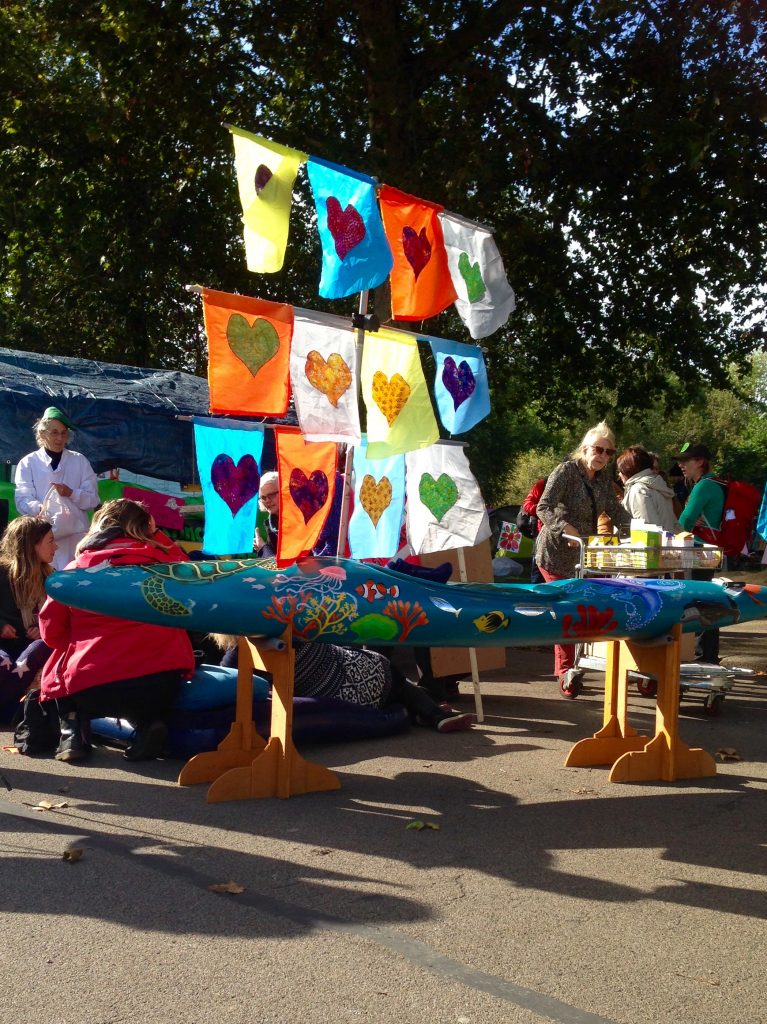
Our site was looking and sounding great. The XR samba band was marching thunderously up and down, the sun was shining, and the site felt full and vibrant. I observed a few ministers going in and out of Downing Street. Rees-Mogg unsurprisingly smirked and gurned at us, playing his pantomime villain act, successfully provoking some boos and hisses. I would have preferred if we had entirely ignored him. Michael Gove, to his credit, came and spoke to us and accepted a leaflet. Priti Patel sneaked in the side entrance, tying to go unnoticed. Groups of schoolchildren and tourists on trips to the Churchill War Rooms gave us encouraging cheers and waves and I was pleased that many of them clutched our leaflets.
It was time to spread some of this vibrancy around and give our support to other sites. The samba band set off around the block and I jumped in to help hold the banner. Marching down the middle of Whitehall in front of the band was glorious. The sound was immense and thrummed right through you, and it was very impressive to watch the band leaders create organised chaos. The sun was shining, and tourists were taking photos. I felt we had created something wonderful, far removed from the spirit-crushing traffic that normally thunders through. Our civic buildings should always look onto riotous public celebration and democracy. The police were doing their best to look severe and disapproving. They didn’t quite let us reach the cabinet office, so we formed a ring outside Horse Guards building and made a delightful racket.
After a while, news filtered through to us that the authorities were making moves on Horseguards Rd, so we quickly rolled our banner and the banner carriers ran to the other side of the block. I didn’t really expect the band to follow us, but it certainly helped us make an entrance back at our site. There we remained, chanting and dancing, while the police gradually filled Birdcage Walk in their hundreds, before surrounding us. Some rebels were bravely locked on to the top of the Da Vinci bridge, so a JCB was brought up with a basket and harnesses on the end of its arm. A rebel with pink hair danced and addressed the crowd, looking striking in the sunlight against the autumn trees, before being lifted into the basket. We were given our section 14 warnings while police dismantled the bridge.
Bridge gone; the cordon started to advance. We raised the volume of our chanting and singing and were joined by XR performance groups in fabulous costumes. For some reason, I was the first to be plucked out of the crowd by the police.
Watching the others be arrested, I was a bit disappointed that I hadn’t sat down in time to make them carry me away. Per the XR advice, I didn’t give my full details, but I did say my first name to humanise the situation. I felt surprisingly relaxed and even managed to direct some tourists to a coffee shop while in handcuffs. I’d taken care to have my book with me, so I made an unsuccessful attempt to read; I wasn’t quite that relaxed. Behind the police lines, it was clear that we were putting a lot of pressure on the Met. I heard the perfect comment over the radio “they’re all good-natured, but there’s sooo many of them!”. When we were finally taken to the vans, I saw that Love Rebellion was still there and the police cordon had dissipated; we had exhausted their resources.
In the van, I had a great chat with some young police officers about the future if climate change is not addressed. They accepted my main point that we had the same end goal to them: a peaceful democratic society that can survive for the foreseeable future. Being booked in at the station still felt quite informal and relaxed. My arresting officer made a comment about use of plastics when taking my mac; I took a deep breath and was about to launch forth about it being quite acceptable to use a plastic item for years before disposing of it properly, but not to use it once and throw it in the sea, but I thought better of it. Afterwards he unloaded his frustration on me about the long shifts we had forced on the police; he had a young child at home who he hadn’t seen for days. This did rattle me, and I apologised. Later I wondered whether I should have justified our actions by comparing this disruption with the risks that our first responders take in extreme weather events, which will only get worse unless action is taken.
The cell was an ugly, dull place and I was very glad I had my book with me. I used my call to check in with XR back office. I was glad that I’d written the number on my arm as I realised that what I thought was my bust card that I’d carefully held onto, was in fact a leaflet. I slept surprisingly well on the thin mattress under a thin blanket and fluorescent light, even despite being woken at 3am to be charged. They hadn’t worked out who I was from my stuff, so I was still ‘J-anon’ and on course for a magistrate’s hearing the next day.
Thursday
After breakfast (watery beans and mushrooms, although I’ve paid for worse to be honest) I was taken to the van to be transferred to the court in Westminster. The van was pleasingly mostly full of rebels so we gave each other some moral support; everyone seemed in good spirits. One other prisoner berated us fairly good-humouredly for the delays we were causing him.
The holding cells under the court were straight out of Porridge, with ugly tiles and heavy steel doors. I still felt relaxed and at ease with what I’d done to get myself here, but I wondered how unsettling this place would be for a vulnerable person. An inmate was yelling and kicking his door. In other circumstances I’d be terrified by this person, but the futility of the fuss he was making, and his clearly miserable life just made me feel sorry for him. It’s not part of XR’s agenda, but I made a mental note to support criminal justice reform in future when I get the chance. I finished my book and the last couple of hours became very boring. Finally, I was taken up to the court by the first person I’d met who really wasn’t interested in what XR stood for. I guess you can’t reach everybody. The magistrate herself was not intimidating and allowed me to read my prepared statement after I pled guilty. I don’t know whether it carried any weight, but I was only given a conditional discharge and costs. After a bit of waiting, I was told I could leave and had the strange experience of wandering the corridors asking for directions to the way out.
It was a relief to be in the open air again, even after only 20 hours inside. I had some supportive phone chats with other Derby rebels and was delighted to hear of XR’s exploits at City Airport. The constant light and unsatisfying food had upset my body-clock and I felt hungover as I walked back to the Love Rebellion site. When I got there, I found that the police were moving us on. Other rebels had done a fantastic job of rescuing my stuff, and I appeared to have everything. The police had put all our tents in a pile, but mine was miraculously on top so was easily fished out. I helped move gear for a while until things looked fairly under control, before deciding I’d had enough and taking a train home.
Catching the last bus from Derby, I got chatting to some Ashbourne residents and it seemed that XR’s message was getting through. We complained about the overwhelming traffic in town and how it was killing the town centre, and quickly moved to discussing more direct ways of driving action, rather than assuming local government would act in our interests. I knew of a working group that had been formed a few weeks before, so I directed them to that. When I mentioned I’d been arrested for my efforts in London, one woman threw her head back and gave a delighted cackle that made all the other passengers turn around.
Second week
Now under a conditional discharge, I would be avoiding getting arrested this week. However, there were many other ways to be involved. I booked accommodation and packed some smart clothes with the plan to focus on outreach. I had planned to return on Monday, but I had a backlog of things to catch up on. Also, very pleasingly, there was already progress with the Ashbourne traffic group and I wanted to attend the meeting on Monday evening.
Tuesday
I arrived at XR’s last remaining campsite in Vauxhall Pleasure Gardens in the early afternoon to find that the police were moving us on again, which seemed completely unreasonable to me. I spent the rest of the day helping to move gear into vans and then to the storage units. We clearly had the support of locals, with several voicing their support.
Wednesday
Lots of dynamic actions going on today. There was a small protest outside Scotland Yard about the impounding of our accessibility gear. I didn’t see much of it as we were stopped and searched as we made our way over. Later I leafleted and spoke to people around our actions in Trafalgar Square and Whitehall. Although reduced in scale, these were still fun and vibrant. Again, there was a lot of public encouragement, and I think I won one person over to the logic of using disruption to drive social change by using the analogy of how effective the hideously annoying ‘go compare’ adverts are. As an argument, it probably needs some development. Further down Whitehall, there was another protest by some Kurds. I got quite emotional when they talked to me about the sacrifices their people had made in recent years and I feel deeply ashamed of how we in the West have hung them out to dry, again.
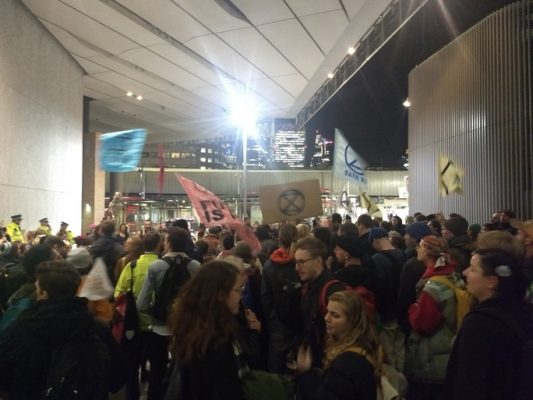
In the evening, I joined the protest outside the News International offices, concentrating on leafleting workers coming out of the side entrance. They had clearly been instructed not to engage as most looked at their shoes as they walked past. I hope at least we made them feel uncomfortable about being on the wrong side of history. One (I think fairly senior) Sun employee did come over and have a long conversation. He seemed to be of the view that The Sun no longer denying the basic reality of climate change meant that they complied with our demand to ‘tell the truth’. I was rather unimpressed by this, given that other parts of the same media empire continued with denialism, and The Sun still does its best to minimise the scale of the emergency, and opposes or mocks any action to tackle it. Still, it remained civil, and I hope I had some influence, and demonstrated I was neither a hedge-dwelling lunatic nor trust-fund mummy’s boy that the press like to characterise us as.
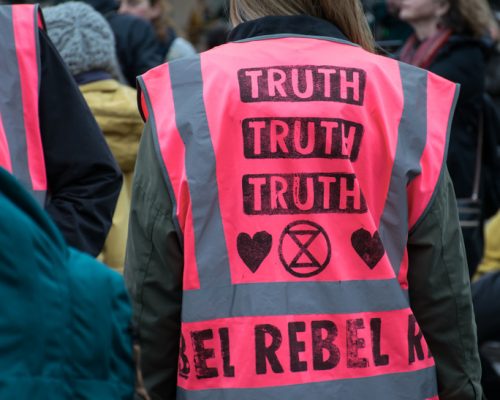
Back in my room, I caught up on social media. I was pleased to see that the proposed tube action had been voted down and heavily panned; I added my voice to the comments opposing and went to sleep secure in the knowledge that it wouldn’t happen.
Thursday
The first thing I saw when I woke was the video of an XR rebel kicking out from the top of a tube carriage. I felt crushed. I had opposed this action for several reasons, primarily safety. I know how on-edge I feel when being funnelled through narrow passages onto crowded trains and the whole thing feels like an environment to promote rage. I feel we were lucky that no-one was seriously hurt. Is this the organisation I worked so hard for and got arrested for? Will this clip be the abiding memory of our rebellion in the eyes of the public?
Several of my affinity group felt similar, so we arranged to meet up. We were briefly stopped by transport police concerned that we were on the way to an action. They quickly realised we were just looking for coffee when we unloaded our feelings about the recent turn of events.
It was a great relief to be among like-minded people. We talked about our feelings and how the day’s headlines play into the XR theory of change. I started to think that we could come back from this if we showed that we could mature as an organisation. Nevertheless, I still felt the need to take a break, so I decided to skip the XR professionals march I had been planning to join and take the rest of the day off for some sightseeing. Given that I was travelling home the following morning, unfortunately this would be the end of my time with the rebellion.
